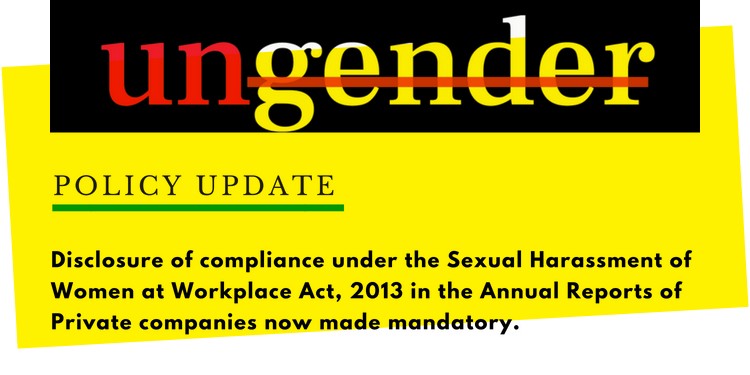Disclosure of compliance under the POSH Act, 2013 in the Annual Reports of private companies now made mandatory

In a noteworthy step taken to ensure safety of workplaces in the private sector, the Ministry of Corporate Affairs, vide a notification dated 31.7.2018 has amended the Companies (Accounts) Rules, 2014. The amendment makes it mandatory for all private companies to make disclosure of compliance under Sexual Harassment of Women at Workplace (Prevention, Prohibition and Redressal) Act 2013 (“POSH Act”) through their Annual Board Report. As per the amended law, every company will now have to submit a statement in their annual Board Report that the company has complied with the provisions relating to the constitution of Internal Complaints Committee under the POSH Act.
It is important to note that this is in addition to the mandatory Annual Report that companies have to file under the POSH Act to the District Officer located in their area of operation every year.
What is the amendment?
As per the powers of the Central Government under Section 134 of the Companies Act, 2013, amendment has been made specifically in Rule 8 of the Companies (Accounts) Rules, 2014. Rule 8 of Companies (Accounts) Rules, 2014 defines the categories of matters to be included in Board of Directors’ Report that is filed annually by all registered companies in India. Amendment has been made in Rule 8, sub clause 5 (non-financial disclosures) in the following manner:
8. Matters to be included in the Board’s Report.
……..
(5) In addition to the information and detailed specified in sub-rule (4), the report of the Board shall also contain-
………
(x) a statement that the company has complied with the provisions relating to the constitution of Internal Complaints Committee under Sexual Harassment of Women at Workplace (Prevention, Prohibition and Redressal) Act 2013
Does the amendment apply to all companies?
As per the amendment made to Rule 8 of Companies (Accounts) Rules, 2014, another sub section has been added which says that Rule 8 shall not apply to One Person Company or Small Company, defined in Companies Act 2013.
What is the significance of this amendment? How does it impact companies now?
Section 134 of the Companies Act, 2013 defines the disclosure framework which every company needs to disclose through their Annual Board Reports every year. Non-compliance with this Section attracts heavy fines under the Companies Act 2013, which could lead to imprisonment as well. Rule 8 defines specific information and details to be provided under the Board’s Report. The inclusion of the compliance of the POSH Act now brings the implementation of the Act directly under the purview of the Board of Directors of any Company.
In brief, companies will now need to ensure full compliance with the POSH Act within their offices. Among many other mandatory guidelines provided under POSH Act, every Company needs to ensure that they have a Prevention of Sexual Harassment at Workplace Policy within their companies; form Internal Complaints Committees within their offices (with more than 10 members); ensure that mandatory trainings are completed each year for their employees and Internal Complaints Committee; ensure that mandatory disclosures on the number of complaints received and disposed are made in the annual report required under the Act itself.
Even though compliance of the POSH Act is mandatory through the 2013 Act itself, yet thousands of companies in India were still non-compliant due to lack of checks by an appropriate authority.This amendment in the larger framework of Companies Act 2013 will push the issue of ensuring safety of women at workplace in the forefront and will not be seen as a mere social responsibility by corporates.
Get in touch with Ungender Team at 9811579688/ 9582630056 or write to us at contact@ungender.in to understand more about the compliance required to be done at your workplace under the Prevention of Sexual Harassment at Workplace Act, 2013. Visit www.ungender.in for more information on our various offerings for creating safe workplaces in India.
Read our insights about diversity, legal updates and industry knowledge on workplace inclusion at Ungender Insights. Visit our Blog.
Sign up to stay up-to-date with our free e-mail newsletter.
The above insights are a product of our learning from our advisory work at Ungender. Our Team specialises in advising workplaces on gender centric laws.
or email us at contact@ungender.in




